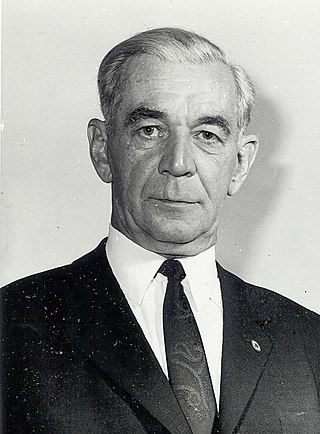Related Research Articles

Domowina is a political independent league of the Sorbian and Wendish people and umbrella organization of Sorbian societies in Lower and Upper Lusatia, Germany. It represents the interests of Sorbian people and is the continual successor of the previous Domowina League of the Lusatian Sorbs.

Jurij Brězan was a German writer. His works, especially the novels, narrative works and children's books, were available in the two languages German and Upper Sorbian.

Kito Lorenc was a German writer, lyric poet and translator. He was a grandson of the writer and politician Jakub Lorenc-Zalěski.
Luise Ermisch (born Luise Thürmer; 20 May 1916 in Halle – 17 January 2001 in Mühlhausen was a German political activist and later a senior politician in the German Democratic Republic, who balanced her political career with an ongoing involvement in the clothing industry.

Erich Grützner was an East German Trades unionist and a senior official in the country's ruling SED (party).
Ferdinand Jung was a German Communist activist who resisted the Nazi government in the 1930s and spent a good deal of time in prisons and concentration camps. In later life he found himself in the political mainstream in his country's second one-party dictatorship and became a senior politician.
Grete Groh-Kummerlöw was a German politician.
Horst Heintze was a German trades union official and politician. Through the union movement he rose to become a member of the People's Chamber (Volkskammer) in the German Democratic Republic and, from 1963, a member of the powerful Party Central Committee. He was unusual in rising this far through the power structure of the country despite having been a Nazi Party member in his youth.
Johannes "Hannes" Hörnig was an East German politician.
Marlies Deneke is a German politician.
Marie Ahlers was a German politician (KPD/SED). She sat as a member of the Reichstag between 1930 and 1933, and was a senior party official in the Soviet occupation zone and German Democratic Republic after 1945.
Maria Weiterer was a German political activist, increasingly prominent in the Communist Party during the 1920s and 1930s.

Friedel Apelt was a German political activist, trades union official and politician (KPD/SED). During the Nazi years she participated actively in anti-fascist resistance, and spent much of the time in prison or as a concentration camp internee. After the war she was able to resume her political career in the Soviet occupation zone.
Arthur Lieberasch was a Communist trades union official who became a member of the Parliament of Saxony and, after 1933 an anti-government resistance activist.
Arnold Gohr was a German clerical worker who became a trade unionist and activist. After 1945 he entered mainstream politics in East Berlin. As the Soviet occupation zone evolved into a Soviet sponsored one-party dictatorship, he never joined the ruling party, remaining instead a leading "collaborationist" member of the eastern version of the Christian Democratic Union. He became a party chairman and served between 1948 and 1958 as "deputy lord mayor" of Berlin, a period during which the increasingly divided city's constitutional status and future were contentious and ambiguous on a number of different levels.

Marja Kubašec was a Sorbian writer who is considered by literary historians to be the first woman to write novels in Upper Sorbian. Working as a schoolteacher, she wrote theatre plays, short stories, biographies, and novels dealing with the history of the Sorbian people.

Katharina "Käthe" Kern became a German anti-government activist during the Hitler years. After 1945 she quickly emerged as a senior politician and party loyalist in the Soviet occupation zone. She served between 1946 and 1985 as a member of what became the powerful Party Central Committee. A long-standing leading figure in the Ministry for the Health Service), she also served, between 1949 and 1970, as head of the national "Mother and Child department".

Kurt Krjeńc was an East German communist politician who served as Chairman of Domowina from 1951 to 1973.
Jurij Grós was an ethnic Sorbian communist politician who held office before and after German reunification.

Angela Stachowa was a German-Sorbian writer and politician. She received the Domowina Art Prize, the City of Leipzig Art Prize (1986) the OIRT radio play prize, and the Johann Gottfried Herder Medal.
References
- 1 2 3 4 5 6 7 8 Helmut Müller-Enbergs. "Schneider, Maria *9.2.1923 Mitglied des Staatsrats". Bundesstiftung zur Aufarbeitung der SED-Diktatur: Biographische Datenbanken. Retrieved 16 February 2015.
- ↑ "Merka (Radibor)". ...Einwohnerentwicklung von Merka. Retrieved 17 February 2015.
- ↑ Günther Buch: Namen und Daten wichtiger Personen der DDR. 2. Auflage. Dietz, Bonn 1979, p. 280.